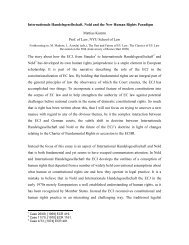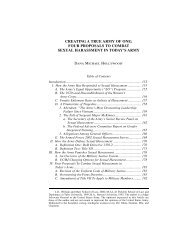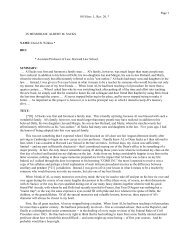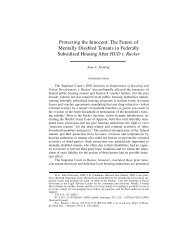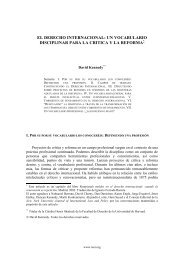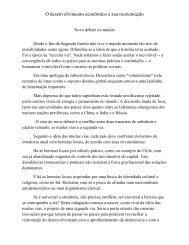Patients as Consumers - Harvard Law School
Patients as Consumers - Harvard Law School
Patients as Consumers - Harvard Law School
You also want an ePaper? Increase the reach of your titles
YUMPU automatically turns print PDFs into web optimized ePapers that Google loves.
MLR 106-4 Edit Format Document Hall Mich L Rev.doc<br />
to ‘delivering’ them. Somehow it would be immoral to do so.” 56<br />
Professor Stein thinks physicians “fear that to introduce monetary<br />
matters into an already unequal (i.e., parent-child) relationship<br />
would only widen the inequality, and would, moreover, demystify the<br />
parental, sacred, qualities that are necessary for an effective<br />
clinical relationship.” 57 And perhaps physicians—who are generally far<br />
wealthier than their patients—are embarr<strong>as</strong>sed to discuss fees patients<br />
may find inexplicably high and crushingly burdensome.<br />
Because physicians do not volunteer prices, patients must <strong>as</strong>k.<br />
But do you want to begin treatment by haggling over prices? You’re<br />
sick, anxious, and intimidated. So you let the doctor set the<br />
boundaries and tone of your relationship. In one study, only twelve<br />
percent of the people questioned had ever negotiated with a provider<br />
to get a lower price. 58 And in our pilot interviews in 2006 with a<br />
convenience sample of thirteen people, only a few patients (who knew<br />
their doctors well) were comfortable <strong>as</strong>king about costs. 59<br />
Consider the well-educated, self-reliant woman trained in<br />
economics who injured her foot and <strong>as</strong>ked a physician to refer her to a<br />
radiology clinic. The X-ray having shown a fracture, she hobbled to a<br />
nearby podiatrist. Told the podiatrist didn’t “take walk-ins” (which<br />
she thought ironic), she pleaded successfully to be seen. Since she<br />
had high insurance deductible, the podiatrist prescribed a boot rather<br />
than a c<strong>as</strong>t. Did this conscientious consumer ever <strong>as</strong>k about money?<br />
A: No, because I figured I’m here, I’m not going to insult him<br />
by saying “how much do you charge?” . . . I could have gone to<br />
the other [medical office in the same building], but let’s say<br />
the other one upstairs is higher, am I going to come back<br />
downstairs now that I’ve insulted him? So it’s a little<br />
difficult to <strong>as</strong>k him his price . . . .<br />
Q: In general, you said it’s insulting to <strong>as</strong>k the doctor. Is<br />
that generally true?<br />
56. Id. at 11. This “position h<strong>as</strong> been articulated so frequently to<br />
me by apprentice and veteran physicians alike that it might be called<br />
official.” Id. at 8.<br />
57. Id. at 9; see also Atul Gawande, Piecework: Medicine’s Money<br />
Problem, New Yorker, Apr. 4, 2005, at 44 (“Doctors aren’t supposed to be in<br />
it for the money, and the more concerned a doctor seems to be about making<br />
money the more suspicious people become about the care being provided.”).<br />
58. Sara R. Collins et al., Gaps in Health Insurance: An All-American<br />
Problem, Commonwealth Fund, Apr. 2006, at 20, available at<br />
http://www.commonwealthfund.org/usr_doc/Collins_gapshltins_920.pdf.<br />
59. The person described in the next paragraph, for instance, said<br />
she would be much more willing to <strong>as</strong>k her regular doctor about the costs of<br />
treatment than to <strong>as</strong>k the hospital because she “would be comfortable with the<br />
trust relationship I’ve got with [my physician].”<br />
U of M <strong>Law</strong> <strong>School</strong> Publications Center, November 2, 2007, 12:51 PM<br />
Page 14




